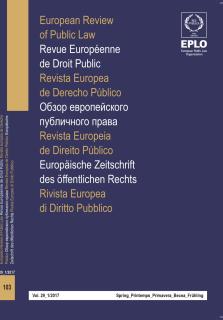
Le territoire et le principe de territorialité
en droit international public
Université Jagellonne, Cracovie, Pologne
International law governs not only the status of a State’s territory and the exercise of State competences on this territory, but also serves as a basis for the organisation of maritime spaces of special status, adjacent to the national territories. The different theories on territories highlight the different aspects of the legal relationships that unite the State to its territory by neglecting sometimes other aspects. The main relationships of the State with its territory can be summarised by the following wordings: 1) ius disponendi, 2) ius imperandi, 3) ius agendi et coercendi, 4) ius aperiendi. If the concept of territorial competence is sufficiently precise for general analyses of the State, its exact scope may be controversial for the legal acts or relationships having transboundary element(s). International law foresees many titles for the competences exercised outside the territory of the State (personal competence, competence in respect of certain areas defined by the law of the sea, universal competence, extraterritorial competence stricto sensu, that is, the competence exercised in respect of certain persons or situations having a tie with the State in question). To disentangle the competences of States, four main types of legal instruments are used: coordination, delimitation by treaties, transfer and outsourcing of competences to the advantage of private entities.
Le droit international régit non seulement le statut du territoire de l’Etat et l’exercice des compétences étatiques sur ce territoire, mais sert aussi de base à l’organisation des espaces maritimes à statut spécial, adjacents aux territoires nationaux. Les différentes théories du territoire mettent en exergue les différents aspects des liens juridiques qui unissent l’Etat à son territoire en négligeant parfois d’autres aspects. Les principaux liens de l’Etat avec son territoire peuvent être résumés par les formules suivantes: 1) ius disponendi, 2) ius imperandi, 3) ius agendi et coercendi, 4) ius aperiendi. Si la notion de compétence territoriale est suffisamment précise pour des analyses générales de l’Etat, son étendue exacte peut prêter à controverses pour les actes ou les relations juridiques à élément(s) transfrontalier(s). Le droit international prévoit plusieurs titres pour les compétences exercées en dehors du territoire de l’Etat (la compétence personnelle, la compétence à l’égard de certains espaces définie par le droit de la mer, la compétence universelle, la compétence extraterritoriale au sens strict, c’est-à-dire la compétence exercée à l’égard de certaines personnes ou situations ayant un lien avec l’Etat en question). Pour démêler les compétences des Etats, quatre principaux types d’instruments juridiques sont utilisés: la coordination, la délimitation par traités, le transfert et l’outsourcing des compétences au profit des entités privées.





















